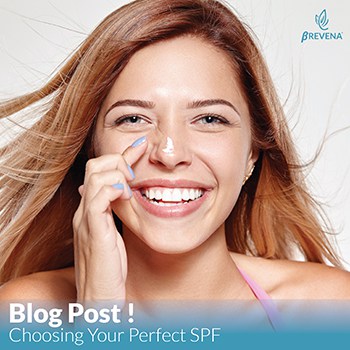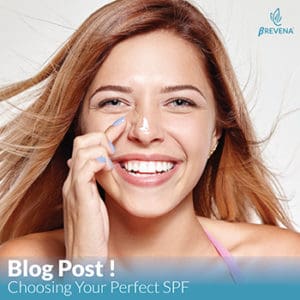Blog Post: Choosing Your Perfect SPF!
We all know sunscreen is important. With so many options, brands and formulas available, how do you begin to determine what SPF is right for you? A quick guide to the different terms and ingredients will help you debunk the packaging and determine what your skin needs. Also, identifying your skin type will help narrow down what formula will work best. It’s critical you find a formula you love and works with your lifestyle. This will help you to get into a good routine with applying SPF every single day.
According to Your Skin Type
FOR DRY SKIN
A creamy formula is best. It helps add hydration to your skin. Choose a lotion or cream with added hydrating/moisturizing ingredients, such as glycerin, lanolin, oils, silicones (like dimethicone) and aloe to add a boost of moisture.
FOR NORMAL SKIN
If your skin is right in the middle, a lotion- or cream-based sunscreen will provide enough hydration without feeling heavy or oily. Look for an SPF you are comfortable with using. Most start at SPF 15, but go up to SPF 70 or more.
FOR OILY SKIN
Are you battling shine by noon? With oily skin, you want to find a formula with a gel base. Some even contain mattifying ingredients to absorb shine and oil. Look for words like sheer, lightweight or gel on the bottle.
FOR ACNE-PRONE SKIN
Look for gel formulas, which usually contain alcohol, and avoid creamy sunscreens since they may exacerbate breakouts. Mineral based sunscreens are a great option and typically are less reactive for skin. Also, make sure that the label says “oil-free” and “non-comedogenic.”
FOR SENSITIVE, EASILY IRRITATED SKIN
Look for something hypoallergenic and fragrance-free (a mineral formula). Avoid sunscreens with alcohol, fragrances or preservatives. Go for titanium dioxide or zinc oxide instead of ingredients like para-aminobenzoic acid (PABA), dioxybenzone, oxybenzone or sulisobenzone.
FOR AGING SKIN
Not only can you prevent new signs of aging through diligent sunscreen use, but some formulas even contain ingredients to combat past damage. Look for additional ingredients such as peptides and antioxidants for these benefits! Also, a big pair of sunglasses will help protect the delicate skin around your eyes from damaging UVA and UVB rays.
FOR BABIES AND CHILDREN
For babies and children, try a mineral based sunscreen. Often available in an easy to apply stick form, you don’t have to worry about getting any in their eyes. Sunscreens containing zinc oxide and titanium dioxide are better tolerated by people with sensitive skin and can usually be found in sunscreens for babies and children.
According to Your Lifestyle
FOR TRAVELERS & BUSY PROFESSIONALS
Look for a one stop shop. Try a tinted sunscreen or BB Cream to save the step of foundation, sunscreen and moisturizer. Fewer steps AND fewer products to take up precious luggage space!
FOR ATHLETES AND ADVENTURE SEEKERS
If you are active and plan on getting wet, you want to maximize both the SPF (look for 30+) and the effectiveness of your sunscreen type. Thankfully, lots of formulas are water resistant and will stay on better while in the water. “Water resistant” is effective after 40 minutes in the water, “very water resistant” holds up for 80 minutes of swimming. Don’t let these guidelines give you a false sense of security, you still want to reapply liberally post swim!


